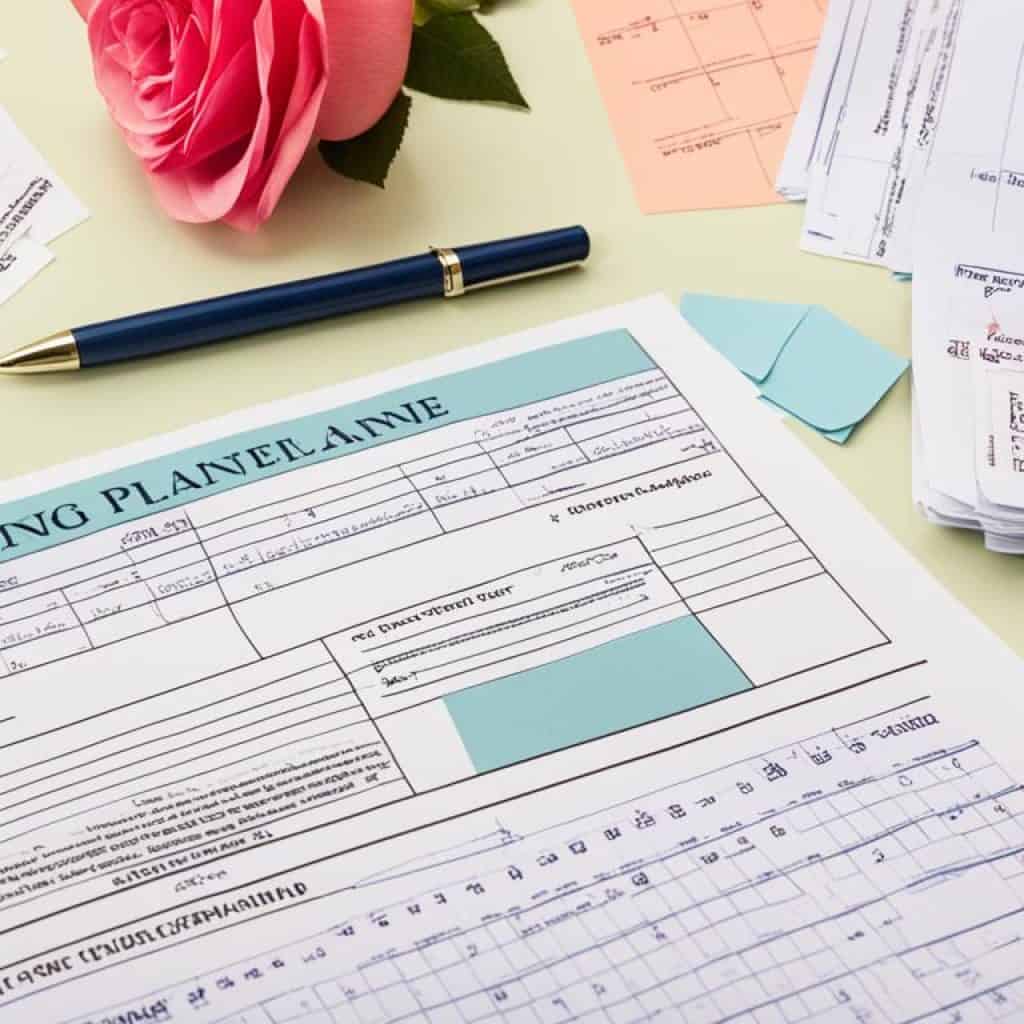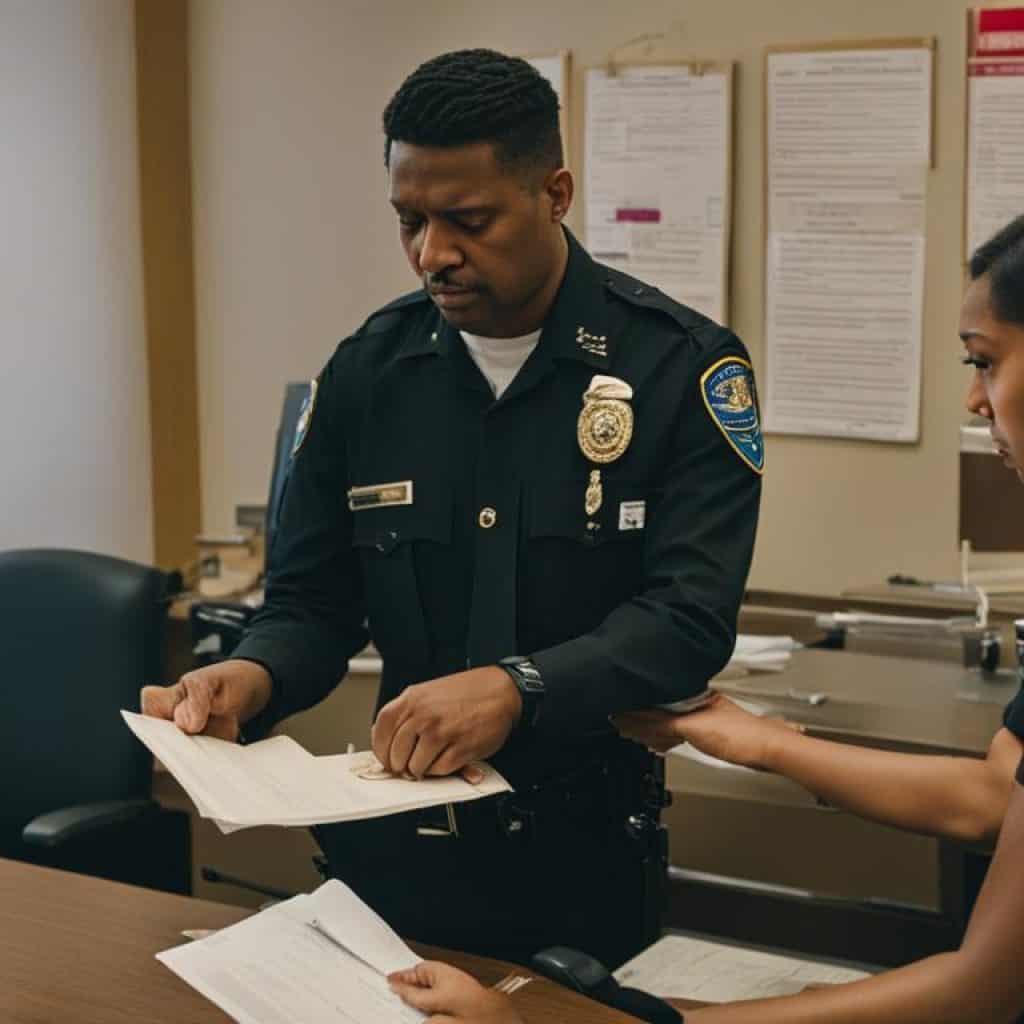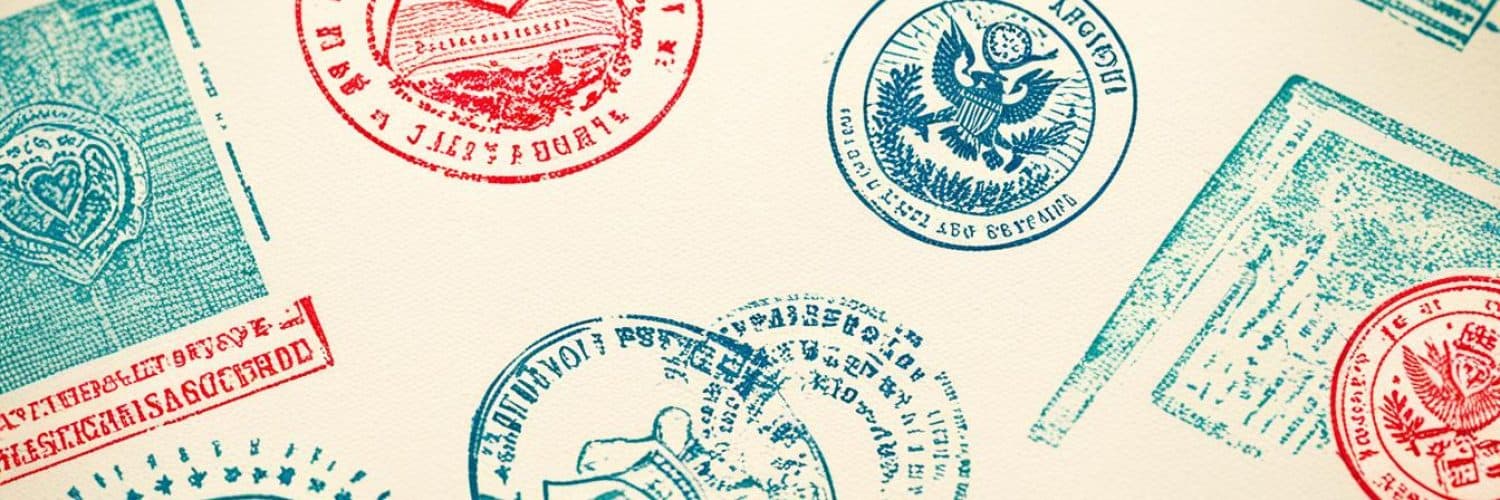Are you ready to take the next step in your relationship? If you’re a U.S. citizen with a foreign partner, obtaining a fiance visa can be the key to bringing your loved one to the United States. But what exactly are the requirements for this visa? And what steps do you need to take to ensure a successful application?
In this comprehensive guide, we’ll walk you through everything you need to know about fiance visa requirements. From eligibility criteria to the documents you’ll need to submit, we’ve got you covered. So, if you’re ready to navigate the complexities of the fiance visa process, read on to discover the essential information you need to make your dreams a reality.
Key Takeaways:
- Understanding the eligibility criteria for a fiance visa is crucial before starting the application process.
- Form I-129F is the initial petition that must be filed with USCIS.
- Completing Form DS-160 and attending a visa interview are necessary steps before obtaining the fiance visa.
- Meeting the financial requirements and providing an Affidavit of Support are key components of the application process.
- After entering the United States on a fiance visa, couples must marry within 90 days and apply for adjustment of status for a green card.
Fiance Visa Eligibility
Before applying for a fiance visa, it’s important to ensure that you meet the necessary eligibility requirements. Here are the key factors to consider:
U.S. Citizenship
In order to sponsor your partner for a fiance visa, you must be a U.S. citizen. Green card holders are not eligible to apply for a fiance visa.
Marital Status
Both you and your partner must be unmarried at the time of applying for the fiance visa. If either of you has been previously married, evidence of divorce or annulment must be provided.
Genuine Relationship
It’s crucial to demonstrate that your relationship is genuine and legitimate. USCIS will carefully review your application to ensure that the intention to marry is sincere and not solely for immigration purposes.
In-Person Meeting Requirement
Generally, you and your partner must have met in person within the two years prior to filing the fiance visa petition. However, there may be exceptions to this requirement if you can prove that meeting in person would be impossible or would cause extreme hardship.
Financial Requirements
As the U.S. citizen sponsor, you must meet the income requirements to support your partner. You will need to provide evidence of your financial ability to maintain your partner above the federal poverty guidelines.
Meeting these eligibility criteria is essential for a successful fiance visa application. It’s important to consult with an immigration attorney or use a reputable immigration services provider to ensure that you meet all the requirements and properly prepare your application.
Filing Form I-129F
Once you have determined your eligibility for a fiance visa and have gathered all the necessary documents, it’s time to begin the application process. The first step is to file Form I-129F, the petition for Alien Fiancé(e). This form is submitted to the U.S. Citizenship and Immigration Services (USCIS) and serves as the official application for the fiance visa.
Form I-129F is an essential part of the fiance visa application, as it establishes the legitimacy of the relationship between the U.S. citizen sponsor and their foreign partner. Along with the form, you will need to provide supporting documents that prove your U.S. citizenship, demonstrate your genuine relationship, and show evidence of meeting in person.
When completing Form I-129F, it’s crucial to be thorough and accurate, providing all the necessary information requested. This includes details about both the U.S. citizen sponsor and the foreign partner, as well as information about any previous marriages or engagements. USCIS will review the form and supporting documents to determine your eligibility for the fiance visa.
| Documents Required for Form I-129F | Examples of Supporting Documents |
|---|---|
| – Proof of U.S. citizenship | – Copy of U.S. passport – Copy of U.S. birth certificate – Certificate of naturalization |
| – Evidence of relationship | – Photographs together – Letters of support from family and friends – Phone records or chat logs |
| – Proof of meeting in person | – Plane tickets – Hotel reservations – Copies of passport stamps |
Once you have completed Form I-129F, assemble the required supporting documents and submit them to USCIS. It’s essential to keep copies of all documents for your records. After USCIS receives your application, they will review it and notify you of their decision. If approved, USCIS will forward the petition to the U.S. embassy or consulate in the foreign partner’s home country for further processing.
Take the first step towards bringing your partner to the United States by filing Form I-129F with USCIS. Ensure you provide all the necessary supporting documents to establish the validity of your relationship and meet the requirements for a fiance visa.

Form DS-160 and Visa Interview
Once Form I-129F is approved, the next step in the fiance visa process is completing Form DS-160, the online nonimmigrant visa application. This form is a crucial part of the visa application and collects essential personal information, as well as details about the intended travel to the United States.
Form DS-160 is designed to assess the eligibility and qualifications of the sponsored partner. It requires providing accurate and detailed information about their background, including their name, address, passport details, travel history, and employment status.
It’s important to complete the Form DS-160 accurately and truthfully, ensuring consistency with the information provided in the initial Form I-129F petition. Any discrepancies or inconsistencies between the two forms can lead to delays in the visa process or even denial.
Once the Form DS-160 is submitted, the sponsored partner will be scheduled for a visa interview at the U.S. embassy or consulate in their home country. The visa interview is a crucial step in the process and is conducted to determine the validity of the relationship and the eligibility for the fiance visa.
During the visa interview, the consular officer will ask questions to assess the genuineness of the relationship and evaluate the intentions of both partners. It’s important to provide honest and consistent answers during the interview. Being well-prepared for the interview can significantly increase the chances of a successful visa application.
To help you prepare for the visa interview, here are a few tips:
- Review your Form I-129F and Form DS-160 to ensure consistency and familiarize yourself with the information you provided.
- Be prepared to answer questions about your relationship, how you met, your plans for the future, and any other relevant details.
- Bring supporting documents that validate your relationship, such as photographs, communication records, and evidence of shared experiences.
- Dress appropriately and present yourself professionally during the interview.
- Be confident, polite, and respectful throughout the interview process.
Remember, the visa interview is a crucial step in the fiance visa process, and it’s important to take it seriously and be well-prepared. By following the guidelines and submitting accurate and truthful information, you can increase the chances of a successful visa application.
Sample Questions Asked During a Fiance Visa Interview:
| Question | Explanation |
|---|---|
| How did you meet your fiance? | The consular officer wants to ascertain the legitimacy of your relationship and validate the information provided in the application forms. |
| When and where did you meet in person? | This question checks if you meet the requirement of having met in person within the past two years. |
| How and when did your relationship progress? | This question helps assess the genuineness and seriousness of your relationship. |
| What are your plans after getting married in the U.S.? | The officer wants to understand your intentions and ensure that your plans align with the purpose of the fiance visa. |
| How do you communicate with your fiance? | Validates the evidence of ongoing communication and demonstrates the level of involvement in the relationship. |
| Do you have any supporting documents to prove your relationship? | This question allows you to present any additional evidence to support the validity of your relationship. |
Financial Requirements and Affidavit of Support
One of the key financial requirements for the fiance visa is the submission of an Affidavit of Support (Form I-134) by the U.S. citizen sponsor. This document serves as a commitment to financially support the sponsored partner during their stay in the United States. It demonstrates to the authorities that the sponsor has the means to provide for their partner’s basic needs and prevent them from becoming a public charge.
The Affidavit of Support serves as proof of the sponsor’s ability to meet the minimum income requirements set by the U.S. government. The sponsor’s income must equal or exceed the minimum federal poverty guidelines for their household size. These guidelines differ depending on the number of people in the sponsor’s household, so it’s important to review the current guidelines to ensure compliance.
In addition to the Affidavit of Support, supporting documentation, such as recent tax returns, W-2 forms, and employment verification letters, may be required to verify the sponsor’s income. These documents help establish the sponsor’s financial stability and ability to fulfill their obligations as a sponsor.
“I am more than willing to support my partner and ensure their well-being during their stay in the United States. The Affidavit of Support is not only a legal requirement but also a commitment to our future together.”
It’s important to note that the financial requirements may vary depending on the specific circumstances of the sponsoring partner. In some cases, alternative forms of financial evidence, such as assets or joint sponsorships, may be considered. Consulting with an immigration attorney or utilizing the services of a reputable immigration service provider can help navigate the complexities of the financial requirements and ensure a thorough and accurate submission.
Overall, meeting the financial requirements and providing the necessary documentation through the Affidavit of Support are essential steps in demonstrating the ability to support the sponsored partner and increasing the chances of a successful fiance visa application.
Medical Examination and Police Clearance
As part of the visa application process, the sponsored partner must undergo a fiance visa medical examination performed by an approved physician. This examination is essential to ensure that the individual is medically admissible to the United States and does not pose any health risks to the public. It includes assessments such as a physical examination, review of medical history, and screenings for communicable diseases.
The fiance visa medical examination is designed to ensure that the sponsored partner meets the health requirements set by the U.S. government. The results of the examination, including vaccinations and any necessary follow-up treatments, will be documented on Form DS-2053, which must be submitted along with other required documents.
Additionally, the sponsored partner must obtain police clearance certificates from all countries where they have lived for more than six months since the age of 16. This is to provide assurance to the U.S. government that the individual does not have a criminal record or pose a security threat. The certificates should be obtained from the appropriate law enforcement authorities in each country and must be submitted as part of the visa application.
It’s important to note that the medical examination and police clearance process can take time, so it’s advisable to start gathering the necessary documentation as soon as possible. Failure to complete these requirements may result in delays or denial of the visa application. Therefore, it’s crucial to carefully follow the instructions provided by the U.S. embassy or consulate and consult with a qualified immigration attorney if needed.
Important Reminders:
- Schedule the medical examination with an approved physician listed by the U.S. embassy or consulate.
- Bring all required documents and vaccination records to the medical examination.
- Obtain police clearance certificates from all countries of residence since the age of 16.
“Completing the fiance visa medical examination and obtaining police clearance certificates are crucial steps in the visa application process. These requirements help ensure the health and safety of individuals entering the United States and maintain the security of the country.”
Timeline and Processing Time
Understanding the timeline and processing time for a fiance visa is essential for planning and managing expectations. While every case is unique and may experience variations, the following provides a general overview:
“The processing time for a fiance visa can vary, but on average, it takes about 6 months from the filing of Form I-129F to the final visa approval.”
This timeline encompasses several stages, including the review of the petition, the visa interview, and additional processing by both USCIS and the U.S. Department of State. It’s important, however, to note that processing times are subject to change and can differ based on individual circumstances.
Here is a breakdown of the typical fiance visa timeline:
| Stage | Timeframe |
|---|---|
| Filing of Form I-129F | Approximately 1-2 weeks |
| USCIS Review | Approximately 4-6 months |
| Visa Interview | Varies based on the embassy or consulate workload (typically a few weeks to a few months) |
| Additional Processing by USCIS and U.S. Department of State | Varies (typically a few weeks to a few months) |
| Final Visa Approval | Varies based on individual case complexity |
It’s important to stay informed and regularly check USCIS and U.S. Department of State websites for updates on processing times. Additionally, factors such as the completeness of the application, supporting documents, and response times from both the applicant and government agencies can impact the overall processing time.
Costs and Fees
When applying for a fiancé visa, it’s important to be aware of the various costs and fees involved. Planning ahead and budgeting for these expenses can help ensure a smooth and successful visa application process.
Filing Fees
One of the primary costs associated with a fiancé visa is the government filing fee for Form I-129F. Currently, this fee is set at $535. This fee covers the processing and review of the petition by U.S. Citizenship and Immigration Services (USCIS).
Medical Examination and Police Clearance
As part of the visa application process, a medical examination is required for the sponsored partner. The cost of this examination will vary depending on the location and healthcare provider. Additionally, obtaining police clearance certificates from all countries where the sponsored partner has lived for more than six months since the age of 16 may also incur fees.
Visa Application Fee
Once the Form I-129F petition is approved, the sponsored partner will need to complete Form DS-160, the online nonimmigrant visa application. There is a visa application fee of $265, which is paid directly to the U.S. embassy or consulate where the visa interview will take place.
It’s important to note that these fees are subject to change, so it’s essential to check the latest fee schedule with the appropriate government agencies.
Did you know? Properly budgeting for fiancé visa costs and fees can help reduce stress and unexpected financial burdens during the application process.
| Expense | Cost |
|---|---|
| Form I-129F Filing Fee | $535 |
| Medical Examination | Varies |
| Police Clearance Certificates | Varies |
| Visa Application Fee | $265 |
It’s important to keep in mind that the costs listed above are just an estimate and may vary depending on individual circumstances. It’s recommended to consult with an immigration attorney or use reliable immigration services to get a more accurate understanding of the total costs involved in the fiancé visa application process.

By understanding the costs and fees associated with the fiancé visa process, couples can better prepare themselves financially and avoid any unwelcome surprises along the way.
Marriage and Adjustment of Status
Once the sponsored partner enters the United States on a fiance visa and the couple gets married within 90 days, they can then apply for adjustment of status to become a permanent resident. This involves filing Form I-485 and providing additional supporting documents to demonstrate the ongoing validity of the relationship. The adjustment of status process allows the foreign partner to obtain a marriage green card.
Marriage and Adjustment of Status Process
- Get married within 90 days of entry into the United States on a fiance visa.
- Gather the required documents, including the marriage certificate and proof of ongoing relationship.
- Complete Form I-485, the Application to Register Permanent Residence or Adjust Status.
- Submit Form I-485 along with the supporting documents to USCIS.
- Pay the required filing fee for Form I-485.
- Attend the biometrics appointment to provide fingerprints and photographs.
- Wait for the USCIS to schedule an interview.
- Attend the adjustment of status interview with the foreign partner.
- Provide any additional requested evidence or documentation.
- Receive a decision on the adjustment of status application.
- If approved, the foreign partner will receive a marriage green card.
It’s important to note that the adjustment of status process can take several months to complete, and it’s crucial to carefully follow all instructions provided by USCIS. Having the assistance of an experienced immigration attorney can help streamline the process and ensure all necessary documentation is submitted correctly.
Benefits of Adjustment of Status
Obtaining a marriage green card through the adjustment of status process provides numerous benefits to the foreign partner:
- Legal permanent residence in the United States
- Ability to work and live in the United States indefinitely
- Access to social security benefits
- Eligibility to apply for U.S. citizenship after meeting residency requirements
- Opportunity to sponsor other family members for immigration
The adjustment of status process allows the couple to build a life together in the United States, with the foreign partner enjoying the rights and privileges of a permanent resident.
Case Study: John and Emily
“After entering the United States on a fiance visa, John and Emily had 90 days to get married and apply for adjustment of status. They carefully gathered all the necessary documents, including their marriage certificate, joint financial records, and photographs. With the help of their immigration attorney, they completed Form I-485 and submitted it along with the supporting evidence.
Several months later, John and Emily attended their adjustment of status interview, where they were asked questions about their relationship, shared responsibilities, and future plans. They provided additional photos and supporting documents to further prove the genuineness of their marriage.
Finally, they received the long-awaited approval notice in the mail. John was thrilled to receive his marriage green card, granting him permanent residency in the United States. With their worries behind them, John and Emily could now focus on building their life together in their new home country.”
Through the marriage and adjustment of status process, couples can solidify their relationship and pave the way for a future together in the United States.
| Advantages | Disadvantages |
|---|---|
|
|
Denial and Waiver Options
While applying for a fiance visa, it’s important to understand that not all applications are approved. The United States Citizenship and Immigration Services (USCIS) has the authority to deny a petition if they have concerns about the genuineness of the relationship or if any required documents are missing or insufficient. However, there may be options available for waivers of certain requirements, providing an opportunity to overcome the denial and proceed with the visa process.
Valid Reasons for Waivers
If your fiance visa application is denied, you may be eligible for a waiver of specific requirements. One common waiver option is for the in-person meeting requirement. Normally, both partners must have met in person within the two years prior to the visa application. However, USCIS recognizes that there can be valid reasons why meeting in person was not possible or would cause extreme hardship. Some situations that may qualify for a waiver include:
- Medical conditions that prevent travel
- Political or civil unrest in the foreign partner’s country
- Prohibitive cultural or religious restrictions
It’s important to provide evidence and documentation to support your waiver request, clearly explaining the circumstances that prevented an in-person meeting and how it would cause extreme hardship if required.
Consulting an Experienced Immigration Attorney
If your fiance visa application is denied and you believe you qualify for a waiver, it’s crucial to seek guidance from an experienced immigration attorney. They can assist in evaluating your case, determining the best strategy for a waiver request, and preparing a strong application that addresses all necessary criteria. An attorney’s expertise can increase your chances of success and help navigate the complex legal process.
“A denial doesn’t necessarily mean the end of your fiance visa journey. Explore waiver options and seek the guidance of an experienced immigration attorney to overcome hurdles and continue your path towards a successful outcome.”
Remember, each case is unique, and whether a waiver will be granted depends on the specific circumstances. Having a strong legal strategy and comprehensive documentation is essential when requesting a waiver to address the denial of your fiance visa application.
| Denial and Waiver Options | Key Points |
|---|---|
| Denial | – USCIS has the authority to deny fiance visa petitions |
| Waiver Options | – Certain requirements can be waived, such as the in-person meeting requirement |
| Qualifying Reasons | – Medical conditions, political unrest, cultural or religious restrictions |
| Consult an Attorney | – Seek guidance from an experienced immigration attorney for assistance with the waiver process |

Tips for Success
Obtaining a fiance visa requires careful attention to detail and thorough preparation. To increase your chances of success, follow these essential tips:
- Read and Follow Instructions: Familiarize yourself with the instructions provided by USCIS and the U.S. Department of State. Follow all guidelines to ensure that you complete each step correctly.
- Provide Complete and Accurate Information: Double-check all the information you provide on the forms. Make sure it is accurate, consistent, and matches the supporting documents you submit.
- Submit Required Documents on Time: Gather all required documents, such as proof of relationship, evidence of meeting in person, financial documents, and police clearance certificates. Submit them within the specified timelines to avoid any delays or complications.
- Consult an Immigration Attorney: Consider seeking advice from an experienced immigration attorney. They can guide you through the application process, review your forms and documents, and provide valuable insights tailored to your specific circumstances.
- Use a Reputable Immigration Services Provider: If you prefer not to hire an attorney, you can use a reputable immigration services provider like Boundless. They offer comprehensive support to ensure that your application is properly prepared and filed.
- Prepare for the Visa Interview: Take the time to familiarize yourself with the interview process and common questions. Practice your responses and gather any additional evidence that may strengthen your case.
- Be Honest and Transparent: During the visa interview, be honest and transparent in your responses. Provide clear and concise answers, and provide any additional documents requested by the consular officer.
Remember, each case is unique, and success is not guaranteed. However, following these tips can significantly improve your chances of a successful fiance visa application.
| Tips | Benefits |
|---|---|
| Read and Follow Instructions | Avoid mistakes and delays in the application process |
| Provide Complete and Accurate Information | Ensure consistency and credibility in your application |
| Submit Required Documents on Time | Avoid unnecessary processing delays |
| Consult an Immigration Attorney | Benefit from professional guidance tailored to your case |
| Use a Reputable Immigration Services Provider | Ensure your application is accurately prepared and filed |
| Prepare for the Visa Interview | Feel confident and prepared during the interview |
| Be Honest and Transparent | Build credibility and trust with the consular officer |
Boundless Reviews and Customer Success Stories
“Thanks to Boundless, my fiance visa application was a breeze. Their knowledgeable team guided us through every step and provided us with accurate and up-to-date information. I highly recommend their services for anyone going through the fiance visa process.” – Sarah O.
“We are forever grateful to Boundless for making our dream of being together in the United States a reality. Their expertise and attention to detail were instrumental in ensuring our visa application was successful. I can’t thank them enough.” – Michael T.
If you’re looking for a smooth and successful visa application experience, Boundless is the way to go. Our team of experienced professionals will guide you through the entire process, providing you with the support and expertise you need to navigate the complexities of the fiance visa requirements. Join the growing list of satisfied customers who have achieved their visa goals with Boundless.
| Name | Visa Type | Outcome |
|---|---|---|
| Emily J. | Fiance Visa | Approved |
| David M. | Fiance Visa | Approved |
| Samantha R. | Fiance Visa | Approved |
Conclusion
The fiance visa process can be complex, but with the right information and guidance, it is possible to successfully obtain a fiance visa and begin a life together in the United States. By understanding the requirements, gathering the necessary documents, and following the step-by-step process, couples can navigate the visa process with confidence.
Throughout this guide, we’ve covered the key aspects of the fiance visa application, including eligibility criteria, filing the necessary forms, financial requirements, medical examinations, and the timeline for processing. We’ve also provided tips for success and highlighted the importance of seeking professional guidance when needed.
Remember, the journey to obtaining a fiance visa may have its challenges, but the reward of being able to build a life with your loved one in the United States is priceless. With determination, patience, and the right resources, couples can overcome any obstacles they may encounter along the way. We hope this guide has provided you with valuable insights and empowered you to take the necessary steps to make your dreams a reality.
FAQ
What is a fiance visa?
A fiance visa allows a U.S. citizen to sponsor their foreign partner to legally enter the United States and get married.
Who is eligible for a fiance visa?
To be eligible for a fiance visa, the sponsoring partner must be a U.S. citizen, both partners must be unmarried, have a genuine relationship, and have met in person within the two years prior to applying.
What is Form I-129F?
Form I-129F is the petition that the U.S. citizen sponsor must file with USCIS to establish the legitimacy of the relationship and intention to marry.
What is Form DS-160?
Form DS-160 is the online nonimmigrant visa application that the sponsored partner must complete. It collects personal information and details about the intended travel to the United States.
What is an Affidavit of Support?
An Affidavit of Support (Form I-134) is a document that the U.S. citizen sponsor must provide to demonstrate their ability to financially support their partner during their stay in the United States.
What is the timeline for a fiance visa?
The processing time for a fiance visa can vary, but on average, it takes about 6 months from the filing of Form I-129F to the final visa approval.
What are the costs associated with a fiance visa?
The costs include government filing fees, medical examination fees, police clearance certificate fees, and the visa application fee.
What is adjustment of status?
Adjustment of status is the process that allows the foreign partner to become a permanent resident after entering the United States on a fiance visa and getting married within 90 days.
Can a fiance visa application be denied?
Yes, a fiance visa application can be denied if USCIS believes the relationship is not genuine or if any required documents are missing or insufficient.
What are some tips for a successful fiance visa application?
It’s important to follow instructions, provide complete and accurate information, and submit all required documents in a timely manner. Consulting with an immigration attorney or using a reputable immigration services provider can also be helpful.
How can Boundless help with the fiance visa process?
Boundless is an immigration services provider that has helped many individuals and couples successfully navigate the fiance visa process. Their customer reviews and success stories demonstrate their expertise and effectiveness.








Add comment